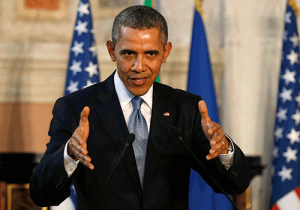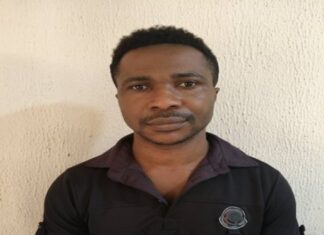Washington leads the way for Nigeria’s anti-terror campaign as her birthday gift to Nigeria, writes Correspondent, SAM NWOKORO.
It is not merely a posture of goodwill. It is Washington’s usual manner of demonstrating seriousness over any issue she considers dear to her interest. And being the world’s headquarters of capitalism and free market, democracy and globalisation, Washington is not expected to take issues of security lying low. She does not prevaricate much on issues of security.
Why?
 Her ideas about a perfect or at least a near perfect economic world order whereby every individual’s destiny is determined by their choice to seek a happy life without the regimentation of irritating state control of opportunities has been vindicated and has entrenched itself as a universal creed. Every nation is now talking about “opening the economy”, investment, foreign capital, empowerment, new frontiers, economic power – and no longer military power.
Her ideas about a perfect or at least a near perfect economic world order whereby every individual’s destiny is determined by their choice to seek a happy life without the regimentation of irritating state control of opportunities has been vindicated and has entrenched itself as a universal creed. Every nation is now talking about “opening the economy”, investment, foreign capital, empowerment, new frontiers, economic power – and no longer military power.
Big economies today like Germany, Russia, South Korea (in short all the Asian Tigers, even including giant China) are eloquent testimonies Washington could boast about whenever the history of capitalism is written. Mingling with democracy (or pluralism) in the political sphere, the Washington construction of social reality, of prosperity guided by equal opportunities in leadership contest, and destiny attainment has triumphed against any other theory so far constructed in the school of social dialectics. So this achievement needs preservation and defence. The ideal has triumphed past any other form of religion or faith so conceptualised. The American way, without doubt, has won universal appeal against any other form of ideology.
Preserving a treasured ideal
Announcement by the U.S. State Department last week said Big Sam would provide $5 million in support of the Nigeria-led multinational force to combat the terrorist group, Boko Haram.
Pan African News Agency (PANA) reports that “the U.S. pledge came after Nigeria’s President Muhammadu Buhari attended the G7 Summit in Germany where he pleaded for international assistance. The U.S. funding, according to the news, supports equipment and logistics as well as other deployment needs. The statement said Washington acknowledged that troops from Nigeria, Chad, Cameroon, Niger and Benin Republic are expected to make the 7,500 multinational force.
The hostilities from Boko Haram, which thawed during the elections, have resumed lately since Buhari assumed office. Perceptive members of the public say, at least, one is recorded per day in the troubled North East states. No doubt, continuation of Boko Haram torments any further has the risk of distracting a government that is yet to constitute a government more than three months after Buhari won the presidential election. And if the Buhari administration fails to act in mobilising counter-insurgency measures quickly, the little gains made in pushing back the Boko Haram members during the Jonathan era, shortly before the elections, might be lost. One study conducted in Washington by a group of researchers, called ‘Learning by Intuition’ reports that roughly 3,000 Americans have lost their lives to terrorism in the last decade. This averages loss of 300 people a year.
It is being interpreted in diplomatic circles that Washington’s earnest pledge of assistance shortly after Buhari’s appearance at the G7 Summit is an express signal to the Buhari administration that Washington bothers about maintaining meaningful and cordial relationship with Nigeria. It also illustrates that she regards Nigeria more than the rest G7 members by being the first to pledge assistance towards the fight against terrorism.
U.S. Ambassador to Nigeria, James Entwistle, speaking on U.S.-Nigeria relations had told a Nigerian journalist shortly before the general election: “Transfer of equipment is under consideration. Information sharing continues. We continue to train your (army) and so on. We are bringing people who have had experience in Afghanistan and Iraq and sharing that competencies around the world.”
A recent Study Group’s white paper say that Washington did poorly in anticipating the spin of political undercurrents that led to the Arab Spring in most parts of Africa and Middle East between 2009 and 2013, during which many hundreds of thousands of people were killed in sectarian crises in the Maghreb regions of Africa. Hence Washington is determined to latch on the African Union (AU)-assembled multinational force fighting Boko Haram in the North East to rid the place of an enlarged terrorist network more than the present scale, before the group spills out of containment.
Another school of thought also posits that Washington’s early announcement of pledges to fight terrorism in Nigeria is to ensure she upstages other countries in geo-influence.
According to Dr. Tony Chukwu, a former don at the University of Lagos (UNILAG), but now in private consultancy, “Washington’s early engagement with the Buhari government as can be seen in the $5 million pledge is indicative of Washington’s view that Nigeria is a serious country worthy of attention. It goes to show that all is not as bad as politicians try to make it seem. In today’s rating of sovereign economies, what you look at are the fundamentals, that is, the state of infrastructure, the availability of both solid and mineral resources, the manpower stock, because these things are key investment decision drivers that can compel corporations to investment because they see there is room for expansion.
“You could also talk about the tax system. But before, emphasis used to be such matters as per capita income, Gross Domestic Product (GDP), security and all that. Today, these things, though they count in rating an economy, do not necessarily constitute the core reason corporations nowadays decide where to invest.”
For the don, there is high potentials in Nigeria’s economy than in any other African country today.
“And Washington foresees that as soon as Nigeria overcomes her security challenges in North East, there would be rapid growth in the economy. So they want to take prime position. They have confidence that since Buhari was once a military head of state, he would be in a better position to command the respect of the military establishment who had in the past been linked with sabotaging of the insurgency war,” he added.
The earnest demonstration by Washington to assist in the security aspect of Nigeria’s affairs could also be interpreted to mean that she does not want any other foreign power to upstage her in dealings with the Buhari regime which Washington, more than other countries, played active role in seeing to its fruition last March and inauguration four weeks ago.
Dr. Chukwu said Washington naturally would want to reap the benefit in terms of geo-political influence on her investment in Nigeria’s security.
A birthday pledge
Also, the pledge by Washington could also be seen in the context of national mood. The 236th birthday of the U.S. comes up on July 4. Buhari at last resolved to change his ‘avoid Aso Rock’ posture last week, and formally moved into the Presidential Villa.
Sources informed TheNiche that Buhari wanted to remain at the Defence House, Abuja, Nigeria’s Defence Headquarters where he had ensconced himself since he won election, as a practical (not posture, but real) strategy to effectively take over the battle against Boko Haram. However, it was learnt that he was persuaded to move into Aso Rock, which is his constitutional address. It would appear odd if the head of state would be receiving top U.S. diplomats who may come to pay him homage in the tradition of diplomatic relations when Washington would be celebrating her national day in Abuja next week.
When somebody is celebrating her birthday, he or she is in happy mood, and remembers good friends and pledges. Making the $5 million pledge on the heels of her national day is interpreted in diplomatic circles as practical message to the people and government of Nigeria, that in Washington’s calculation, Nigeria is worth her courtship and investing her trust in.
According to diplomatic norms, “strategic partnerships are built on shared challenges”, according to an online portal of the National Democratic Institute (NDI), a Washington-based notable democracy advocacy body. U.S. has had more than a fair share of troubles from dark forces against civilisation, knowledge and democracy. So she understands the stress Nigeria has been passing though these past years when sectarian terrorism injected its virus in the once peaceful Nigeria.
At a time, Nigeria reportedly was spending an average of N1 billion each day in fighting Boko Haram, a problem that choked national fiscal calculations, which was made worse by dwindling crude oil price.
The original 13 states of America in July 2, 1776 gathered and adopted the document that bound them into a union, and declared their independence from Britain in July 4, 1776. Today the U.S. union is made up of 52 states.














